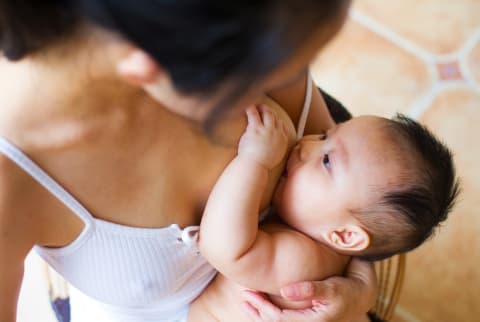Advertisement

Whether you're thinking about having kids soon or have already had one or two, breastfeeding can at times feel like a scary mystery. And the truth is, every breastfeeding experience is unique. Just because a friend or family member experienced breastfeeding one way doesn't mean you will, and moms are often surprised that it can be completely different even between their first and second babies. But getting to know your new baby and the bond you create while breastfeeding is a special experience.
Because breastfeeding can be daunting no matter what stage you're in—particularly if you're worried about how breastfeeding will affect your breasts and body overall—here's what you should know.
How breastfeeding changes your breasts.
While breastfeeding often gets misunderstood for causing physical changes to the breasts, most of the changes to a mom’s breasts actually happen during pregnancy. During pregnancy, your body is in preparation mode: It's preparing to breastfeed your little one, and you may notice that your breasts get larger, your nipples and areolae get larger and darker, and veins in your breasts become more noticeable. If you notice that your breast seem to look different by the hour—changing color slightly, or even changing shape—don't be alarmed by this. This is because as your body is producing milk, your breasts are responding accordingly.
Another big change I see often is nipples becoming sore or cracked, which typically happens when babies are first getting the hang of breastfeeding. It will likely go away once your baby gets more used to breastfeeding, but there are certain products that can help, like Lansinoh's 3-in-1 breast therapy pack. Also, if you find your breasts are leaking in the early weeks, that's not abnormal at all. Your body is still trying to figure out exactly how much milk it needs to produce.
While these differences will continue while you breastfeed, many of these changes will reverse after you give birth or stop breastfeeding. However, it is true your breasts will never be exactly the same as they were before. To help minimize the lasting effects of these changes, my recommendation is to wear a well-fitted nursing bra. You may need to invest in a few sizes, as your breasts get larger during pregnancy and then get smaller again after breastfeeding is established. You should also consider lightly massaging your breasts both during pregnancy and while you're breastfeeding. This will help improve blood flow, giving your breasts more of an ability to bounce back and return to their original state once you're done breastfeeding.
Is breastfeeding painful?
Here's the good news: Overall, breastfeeding shouldn't be painful. But there are some conditions that can pop up that might cause some temporary discomfort. One of the most common is nipple soreness during the early days of breastfeeding. It’s important that your baby gets a good latch when they are feeding, taking all the nipple and as much breast tissue into their mouth as possible. A proper latch will help reduce potential soreness, and if the soreness continues beyond a week or so, be sure to reach out to a lactation professional for help.
If breastfeeding simply isn't working for you, whether because of pain or because your baby won't latch, don't beat yourself up too much. Many women try to breastfeed and aren't successful—this experience is completely normal and will not take away from your bond with your baby.
Breastfeeding and your appetite: What you should know.
Yes, you will probably be extra hungry when you're breastfeeding—and that's OK. Every mom is different, but most of the moms I know definitely notice an increase in appetite when they are breastfeeding. Creating breast milk for your baby is a full-time job and can burn up to an additional 500 calories per day, so be sure to keep your body fueled with a balanced, nutritious diet, and make sure you stay hydrated, too.
Breastfeeding and your sex life.
Sex after giving birth is a tricky topic, and the most important things to remember are to consult your doctor about when the right time is and make sure you have an open, honest conversation with your partner about it, because once you get the all-clear from your doctor, it’s really up to you and your partner. Open, honest communication is the best way to find what works for you as a couple. If soreness in your breasts is what's stopping you from having sex, a light self breast massage can get the blood flowing and reduce soreness a bit. But the most important thing to remember is to do what you're comfortable with, and communicate with your partner about any pain you may be experiencing.
While breastfeeding is a unique experience for each and every woman, if anything feels especially abnormal, make sure to talk to your health care provider immediately.
Interested in learning more about breastfeeding? Here's how important it really is.
